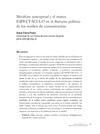Please use this identifier to cite or link to this item:
https://accedacris.ulpgc.es/jspui/handle/10553/55556
| DC Field | Value | Language |
|---|---|---|
| dc.contributor.author | Piñero Piñero, Gracia | en_US |
| dc.date.accessioned | 2019-05-29T12:57:52Z | - |
| dc.date.available | 2019-05-29T12:57:52Z | - |
| dc.date.issued | 2018 | en_US |
| dc.identifier.issn | 1139-7241 | en_US |
| dc.identifier.uri | https://accedacris.ulpgc.es/handle/10553/55556 | - |
| dc.description.abstract | Esta investigación se sitúa en una línea de trabajo definida por la confluencia de la Lingüística Cognitiva y del Análisis Crítico del Discurso, que contribuyen de modo complementario al estudio del texto, integrando su dimensión social e ideológica y su dimensión individual y cognitiva. Partiendo de este marco teórico, examinamos el modo en que el discurso político de los medios de comunicación categoriza al mandatario público acudiendo a metáforas conceptuales deslegitimadoras enraizadas en el dominio cognitivo del ESPECTÁCULO y el TEATRO con el objetivo de focalizar la propiedad de fingidor, de persona que simula lo que no es. A través del análisis de las proyecciones metafóricas establecidas entre la estructura conceptual que presta este dominio y el tópico de la política, comprobamos el dinamismo consustancial a los procesos de categorización, que dependen en buena medida de las representaciones conceptuales de los sujetos, quienes, mediatizados por modelos mentales y culturales, seleccionan los marcos específicos sobre los que proyectan el tema del discurso y, con ello, establecen los elementos relevantes de su particular interpretación de la categoría. Constatamos, finalmente, que la conceptualización metafórica de la política como simulación, como engaño, constituye una representación socialmente compartida, que ejerce en el corpus analizado una doble función, pues al tiempo que actúa como un marco general que otorga coherencia al discurso, contribuye a crear una narrativa, un circuito de emociones negativas, que repercute en la calificación ética de la entidad. | en_US |
| dc.description.abstract | Our research lies at the point of confluence of Cognitive Linguistics and Critical Discourse Analysis, two disciplines that contribute in a complementary way to the study of texts by integrating on the one hand, their social and ideological dimension and, on the other, their individual and cognitive aspects. Supported by this theoretical framework, our study explores the way in which political discourse in the media categorises public figures by drawing on delegitimising conceptual metaphors which are rooted in the cognitive domain of THEATRE and SPECTACLE with the aim of focalising the characteristics of deception and of pretence of what one is not. Through analysis of the metaphoric mappings established between the conceptual structure of this domain and the topic of politics, we find a dynamism that is consubstantial with the processes of categorisation that depend largely on the conceptual representation of individuals who, influenced by their mental and cultural models, select the specific frames on which to map the discourse topic and consequently establish the elements relevant to their particular interpretation of a category. Finally, we demonstrate that the metaphoric conceptualisation of politics as imitation or deception constitutes a socially shared representation. In our corpus, it exercises a dual role, acting at the same time as a general framework providing discourse coherence, and also contributing to creating a narrative, a circuit of negative emotions, that has repercussions on the ethical status of the entity. | en_US |
| dc.language | spa | en_US |
| dc.relation.ispartof | Iberica | en_US |
| dc.source | Ibérica [ISSN 1139-7241], n. 36, p. 119-142 | en_US |
| dc.subject | 5701 Lingüística aplicada | en_US |
| dc.subject.other | Discurso político | en_US |
| dc.subject.other | Metáfora conceptual | en_US |
| dc.subject.other | Deslegitimación | en_US |
| dc.subject.other | Espectáculo y teatro | en_US |
| dc.subject.other | Narrativa | en_US |
| dc.subject.other | Political discourse | en_US |
| dc.title | Metáfora conceptual y el marco ESPECTÁCULO en el discurso político de los medios de comunicación | en_US |
| dc.title.alternative | Conceptual metaphor and the frame SPECTACLE in political discourse in the media | en_US |
| dc.type | info:eu-repo/semantics/Article | es |
| dc.type | Article | es |
| dc.identifier.isi | 000449461500006 | |
| dc.description.lastpage | 142 | - |
| dc.description.firstpage | 119 | - |
| dc.investigacion | Artes y Humanidades | en_US |
| dc.type2 | Artículo | en_US |
| dc.contributor.daisngid | 4556978 | |
| dc.contributor.wosstandard | WOS:Pinero-Pinero, G | |
| dc.date.coverdate | Otoño 2018 | |
| dc.identifier.ulpgc | Sí | es |
| dc.description.sjr | 0,259 | |
| dc.description.jcr | 0,429 | |
| dc.description.sjrq | Q2 | |
| dc.description.jcrq | Q4 | |
| dc.description.sellofecyt | Sello FECYT | |
| dc.description.ahci | AHCI | |
| dc.description.ssci | SSCI | |
| dc.description.fecytq | Q1 | |
| dc.description.fecytpuntuacion | 73,95 | |
| dc.description.dialnetimpact | 0,0 | |
| dc.description.dialnetq | Q1 | |
| dc.description.dialnetd | D2 | |
| dc.description.erihplus | ERIH PLUS | |
| item.fulltext | Con texto completo | - |
| item.grantfulltext | open | - |
| crisitem.author.dept | GIR IATEXT: Cognición, Lingüística, Texto y Procesamiento de la Información | - |
| crisitem.author.dept | IU de Análisis y Aplicaciones Textuales | - |
| crisitem.author.dept | Departamento de Filología Hispánica, Clásica y de Estudios Árabes y Orientales | - |
| crisitem.author.orcid | 0000-0002-4989-3319 | - |
| crisitem.author.parentorg | IU de Análisis y Aplicaciones Textuales | - |
| crisitem.author.fullName | Piñero Piñero, María De Gracia | - |
| Appears in Collections: | Artículos | |
WEB OF SCIENCETM
Citations
1
checked on Jun 8, 2020
Page view(s)
317
checked on Jan 15, 2026
Download(s)
136
checked on Jan 15, 2026
Google ScholarTM
Check
Share
Export metadata
Items in accedaCRIS are protected by copyright, with all rights reserved, unless otherwise indicated.
